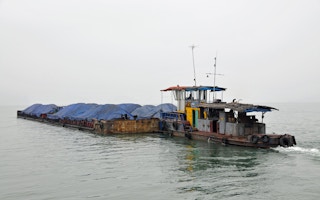Following recent criticism for backing a controversial coal-fired power plant in Vietnam, the Export-Import Bank of Malaysia (Exim Bank) has described the US$2.68 billion facility as being aligned with Vietnam’s energy transition plan, as it will use new emissions-reducing technology.
To continue reading, subscribe to Eco‑Business.
There's something for everyone. We offer a range of subscription plans.
- Access our stories and receive our Insights Weekly newsletter with the free EB Member plan.
- Unlock unlimited access to our content and archive with EB Circle.
- Publish your content with EB Premium.
The 2.12-gigawatt (GW) Song Hau 2 plant has since been confirmed to be terminated by the Vietnamese government, according to a filing on Bursa Malaysia on Thursday evening by developer Toyo Ventures. The government cited issues with financing arrangements not being resolved as the main reason for termination.
The plant was supposed to be the first coal-fired power plant in Vietnam to use the ultra-supercritical (USC) technology, reducing emissions compared to traditional coal-fired plants, Exim Bank said in an earlier press statement. A coal-fired power plant with USC technology typically requires less coal to produce the same amount of electricity as a traditional plant.
“The USC technology is at the forefront of [the] energy transition, offering substantial efficiency and environmental benefits,” Exim Bank said in a statement on Tuesday.
Although this technology is new to Vietnam, it has already been adopted in Malaysia and Indonesia. Malaysia’s energy transition minister announced last week that the country was committed to a complete phase-out of coal-fired power by 2044, ahead of its 2050 net-zero goal.
Critics highlighted that Malaysia’s involvement in financing arrangements for the Song Hau 2 plant would jeopardise Vietnam’s Just Energy Transition Partnership (JETP) deal with developed economies for US$15 billion to finance clean energy initiatives. Under the 2022 resource mobilisation plan for its JETP agreement , Vietnam must reduce the country’s pipeline for coal-fired generation towards a peak of 30.2 GW. The country also committed to no new coal-fired power plants after 2030, and to reduce the scale of coal power capacity after 2035.
The US State Department said that it would be closely monitoring reports of new coal plants being built, as these could “complicate efforts” by Vietnam to achieve its JETP targets.
In response to media queries from Eco-Business after publishing its press statement clarifying its role in the Song Hau 2 project, Exim Bank confirmed that it is not the provider of a recently-inked US$980 million loan deal, after media outlets reported that it was behind the loan. Instead, it only arranged for the equipment financing facility of the full sum to be provided by Singapore-based engineering solutions provider i-Power Solutions Pte Ltd.
With regards to whether it has put up any share of the loan as the mandated lead arranger for the US$2.68 billion fund raising exercise, it said: “We are not able to disclose the parties involved at the present moment.”
Eco-Business has corrected a previous article published on the role of Exim Bank in the deal.
Exim Bank emphasised that its appointment as lead arranger should not be “construed as a financing commitment or obligation” to fund any amount of the project on its part.
In the 2 July press statement, Exim Bank said the project involves collaboration with other regional development banks, “leveraging technical experience on energy transition solutions with other countries in Asean”. The entire fundraising exercise was co-led by one of Vietnam’s largest state banks, with more than 60 per cent of the funds to be raised coming from 10 Vietnamese banks, it revealed, without naming the banks involved. On how it will raise the rest of the 40 per cent of the funds, Exim Bank told Eco-Business the arrangement is still ongoing.
‘Biggest of its kind’ fund raising
Exim Bank Malaysia, which is a government-owned development bank, said that the Song Hau 2 project is aligned with Vietnam’s energy transition plan, as well as Malaysia’s upcoming chairmanship in the Asean regional grouping. It highlighted that the initiative, “one of the biggest of its kind” with a Malaysian bank co-leading a fund-raising exercise for an overseas project, should be seen as a “regional effort”.
The project aligns with Vietnam’s plan to phase out less efficient traditional coal plants and is in support of the country’s aim to reduce coal power reliance to 20 per cent by 2030, from 31.1 per cent, it said, adding that it will address the critical energy shortages in Southern Vietnam, benefiting 32.4 million people facing continuous power shortages and contributing to poverty alleviation efforts.
“As a developmental financial institution, the Bank is committed to supporting equitable and just energy transition efforts. The Bank approaches environmental considerations from a multifaceted perspective: reducing emissions through high- efficiency technology, supporting renewable energy efforts, and ensuring dignified standards of living for the most vulnerable members of society across Asean member states.”
“Vietnam’s energy transition plan considered the calculation of when the Song Hau 2 project is operational,” it said.
Specifically, the USC technology enables “cleaner combustion” and is able to support variable wind and solar energy, said Exim Bank. “The USC technology can also accommodate carbon capture and storage (CCS) requirements,” it said, compared to older cold-fired plants which would require costly retrofitting of boilers, turbines, and generators to meet responsible emission standards.
The construction of the plant was previously managed by an engineering, procurement, construction and commissioning consortium made up of Malaysian outfit Sunway Construction and Vietnam’s Power Engineering Consulting Joint Stock Company 2, a subsidiary of national utility company Vietnam Electricity. In May, Sunway Construction said in a statement to the stock exchange May that no construction work had yet to begin on Song Hau 2.










